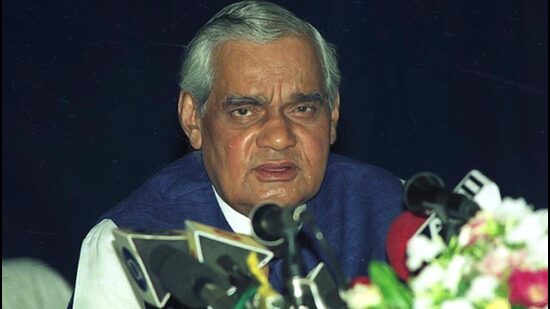Remember Vajpayee for good governance
Good governance also encompasses other critical facets such as the rule of law, efficiency, responsiveness, sound financial management, ethical conduct, human rights, diversity and building competent institutions. While welfare initiatives constitute one of the main pillars of good governance, it is essential to ensure that the taxpayers resources are not squandered on freebies and unproductive schemes
As we pay our tributes to the memory of former Prime Minister (PM), late Atal Bihari Vajpayee, on his birth anniversary today, let us also reflect on how he left his indelible stamp on governance with an emphasis on reforms with a human face. Vajpayee-ji’s approach to governance hinged on the concept of surajya or sushasan (good governance) as the cornerstone of a people-centric model that would drive development. I firmly believe he was right in stressing governance reforms, which would take development to the last mile. I believe people-centric services such as health care, education, water supply, sanitation, electricity, security and safety lie at the heart of a responsive governance model.

I had the privilege of working with Vajpayee-ji for many years and consider him my mentor and role model. I studied at close quarters the leader and humanist in him. His vision for a development paradigm based on good governance reflected his large-hearted approach to people, with their happiness and satisfaction as the key. Like Mahatma Gandhi, Vajpayee-ji’s vision of the ideal State or the Rama Rajya, was one without inequalities and injustices. After Vajpayee-ji’s initiatives in good governance, we find his vision strengthening in every governance domain under PM Narendra Modi’s leadership with a heightened emphasis on accountability, transparency and responsive administration.
There are some critical aspects of governance that require strengthening to drive development with a human face in line with Vajpayee-ji’s vision. They are ability, accountability, connectivity and credibility. Our wealth of human resources, complemented by one of the best civil services in the world, is the leveraging force of this development trajectory, which has placed India in the league of the world’s most powerful nations. It should be our endeavour to nurture this talent pool and build an ecosystem that fosters efficiency and innovation.
As Vajpayee-ji envisioned, accountability is a critical feature of good governance. While our system is built on accountability and checks and balances, we often find this key element of governance missing when we scrutinise it from the grassroots level. The poorest man in the remotest village must see accountability or answerability and transparency in action and implementation in his interface with the administration. His needs — relating to health, farming, education and housing — must be prioritised to bridge the ever-widening gap between the haves and have-nots. Good governance should be inclusive and succeed in empowering women and the underprivileged.
Good governance also encompasses other critical facets such as the rule of law, efficiency, responsiveness, sound financial management, ethical conduct, human rights, diversity and building competent institutions. While welfare initiatives constitute one of the main pillars of good governance, it is essential to ensure that the taxpayers resources are not squandered on freebies and unproductive schemes.
As I have pointed out on several occasions, connectivity and communication are critical components of good governance. There has to be two-way communication for effective governance and for us to bridge the rural-urban divide and the gender divide, for instance. Our farmers must be connected to the markets and our research labs and knowledge centres to the farmers in the fields. The vast expanses of our rural areas need to be connected to urban centres, and an efficient knowledge network should connect our education centres seamlessly. Good governance, therefore, depends, in large measure, on this connectivity revolution.
The government’s credibility depends mainly on its capacity to match the delivery of services with the promises made. The Direct Benefit Transfer scheme is a commendable initiative that will help weed out corruption and improve governance efficiency.
Electoral reforms constitute another significant aspect of good governance. The use of money and muscle power during elections needs to be checked firmly, and electoral outcomes should not be influenced by extraneous factors such as caste and community. As I have said on previous occasions, people should elect candidates based on 4Cs — Character, Capacity, Calibre and Conduct. Another significant feature of effective governance depends on the increased use of the mother tongue at all levels of education and administration. Therefore, the judiciary must also initiate proactive measures for the broader use of the mother tongue in courts.
Vajpayee-ji was a multi-faceted genius — a poet, thinker, humanist, visionary and a highly popular leader with magnetic appeal. In addition, his disarming wit, humour, and simplicity were endearing attributes.
Vajpayee-ji ushered in the connectivity revolution and brought in a wide range of initiatives towards good governance. Therefore, the finest tribute we can pay to Vajpayee-ji’s memory is to work unitedly as a society, strengthening every initiative towards efficient, effective, transparent, credible and accountable governance.
M Venkaiah Naidu is former vice-president of India The views expressed are personal





